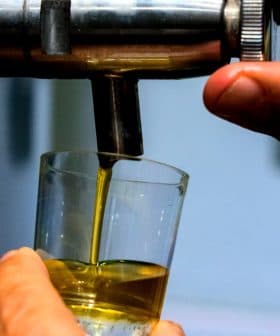 189.9K reads
189.9K readsFood & Cooking
In Greece, Olive Oil Remains Absent from Restaurant and Tavern Tables

Legislation introduced in 2018 required restaurants in Greece to replace bulk olive oil cruets with sealed bottles of branded virgin or extra virgin olive oil, but many eateries have been slow to adopt the rule due to added costs. An amendment in 2020 allowed the use of non-refillable bottles of up to 500 milliliters, but this change has not been widely implemented, depriving diners of added nutrients and olive oil producers of an additional sales outlet.
Every summer, millions of vacationers from around the world flock to Greece to enjoy the gorgeous beaches, visit the countless ancient sites and monuments and taste authentic dishes of Greek cuisine.
With extra virgin olive oil constituting the basis of virtually every food preparation in Greece, the country’s cuisine is one of the most characteristic manifestations of the celebrated Mediterranean diet.
There are no olive oil cruets on restaurant tables since they have been banned, and usually no bottles of branded olive oil due to the added cost.
However, in eateries across the country, locals and tourists have no olive oil available when looking to add extra flavor to their food; olive oil for customer consumption has been steadily disappearing from restaurant and tavern tables in Greece since 2018, becoming almost extinct nowadays.
Legislation introduced that year required the commonly used cruets of bulk olive oil available on restaurant tables to be replaced by tamper-proof, non-refillable bottles of branded virgin or extra virgin olive oil.
See Also:Dakos, the Cretan Meze, Is Having a MomentThe regulation was proposed by market operators reasoning that small, non-reusable bottles would promote quality Greek olive oil and prevent consumers in mass catering establishments from using oils of dubious quality.
Under the new law, each serving in restaurants, hotels, or taverns should be accompanied by a sealed bottle of virgin or extra virgin olive oil — usually 50 milliliters or 100 milliliters – to be opened at the table.
The Confederation of Craftsmen and Merchants (GSEBEE) hailed the measure as an opportunity for the olive oil sector to increase its sales. According to estimates, around 10,000 tons of Greek olive oil would be required annually to fill the sealed bottles that would adorn the tables in eateries across the country.
However, food establishments in Greece have been slow to adopt the rule, mainly due to the added cost, which some restaurateurs chose to pass on to their customers.
“Unfortunately, we have to charge for the sealed olive oil bottles, whose price starts from about €1 for 50 milliliters — which is absurd if one takes into account that olive oil is an essential part of the diet and a basic food,” restaurant owner Ioannis Kouzoupis told Olive Oil Times in September 2018, almost six months after the new legislation had come into force.
Yiorgos Economou, the general director of Sevitel, the association of Greek olive oil bottlers, noted that olive oil for customer consumption is now completely absent from the country’s food-serving outlets.
“There are no olive oil cruets on restaurant tables since they have been banned, and usually no bottles of branded olive oil due to the added cost,” Economou told Olive Oil Times. “When customers ask for extra olive oil on their food, their dish is usually returned to the kitchen for topping up.”
To curb the incurred costs, an amendment to the legislation in 2020 allowed restaurateurs to use non-refillable bottles of up to 500 milliliters, which would remain on the table until emptied, regardless of how many customers used it.
However, three years later, the amendment remains largely uncommunicated and unexploited by eateries in the country, depriving diners of added nutrients and an extra touch of flavor in their salads and Greek olive oil producers of an additional sales outlet.
“It was the mix of the Covid-19 lockdowns, the ongoing food price inflation and the recent energy crisis that undermined the initiative of placing branded olive oil on restaurant tables,” Yiorgos Kavathas, a restaurateur and head of the Panhellenic Association of Restaurants and Associated Professions (POESE), told Olive Oil Times.
“Nevertheless, It is a requirement of the relevant market rule that eateries in the country make olive oil available to their customers,” Kavathas said, adding that the association’s intention is for branded olive oil to reemerge on restaurant and tavern tables.
See Also:Campaign in Crete Urges Hospitality Establishments to Choose Local Olive Oils“A campaign should be launched for branded Greek olive oil to reclaim its spot on restaurant and tavern tables,” he continued. ”I also believe that the extra cost for customers is negligible.”
In a roundtable discussion held last autumn in Rethymnon, Crete, participants also indicated that the use of glass bottles of 500 milliliters is more financially viable and environmentally friendly than the use of smaller 50- or 100-milliliter bottles of olive oil for individual use.
Experts at the discussion said placing olive oil in glass bottles of 500 milliliters on restaurant tables would have no real impact on the quality of the oil even after one month of use.
Meanwhile, after inspections by the authorities, food establishments in Athens and the southern town of Kyparissia were fined €500 each for placing unbranded cruets of olive oil on their tables.
“We have already started sweeping checks in hotels and food establishments across Greece,” said Kostas Skrekas, the newly-appointed Greek minister for development. “And we will go on. We have to protect the Greek products.”
Economou agreed that the law’s application had weakened in the country due to the prevailing socioeconomic conditions at the time.
“The law of 2018 aimed to promote branded Greek olive oil in eateries, and the 2020 amendment [allowing bottles of up to 500 milliliters] was chiefly introduced to keep the costs down,” Economou said.
“However, despite being a requirement, the backwash of the financial crisis and the Covid-19 pandemic shaped an unfavorable environment for such a measure to materialize,” he added. “The ministry and the market operators decided not to put an extra burden on the food-serving sector of the country.”
Economou noted, however, that diners’ use of branded Greek olive oil in restaurants and taverns would benefit the country.
“We are contemplating discussing with the ministry how the measure can be brought back,” he said. “It will significantly contribute to the image of Greece and become the country’s ambassador to the 20 million foreign tourists who visit our country every year.”









